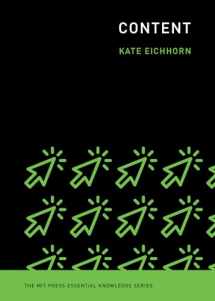
Content (The MIT Press Essential Knowledge series)
Book details
Summary
Description
A concise introduction to content and the content industry, from the early internet to the Instagram egg.
From the time we roll out of bed to check overnight updates to our last posts, likes, and views of the previous day, we're consuming and producing content. But what does the term “content” even mean? When did it become ubiquitous? And at what cost? In this volume in the MIT Press Essential Knowledge series, Kate Eichhorn offers a concise introduction to content and the content industry, examining the far-reaching effects content has on culture, politics, and labor in a digital age.
Eichhorn traces the evolution of our current understanding of content from the early internet to the current social mediaverse. The quintessential example of content, she says, is the Instagram egg—an image that imparted no information or knowledge and circulated simply for the sake of circulation. Eichhorn explores what differentiates user-generated content from content produced by compensated (although often undercompensated) workers; examines how fields from art and literature to journalism and politics have weathered the rise of the content industry; and investigates the increasing importance of artists’ “content capital”—the ability of artists, writers, and performers to produce content not about their work but about their status as artists.


We would LOVE it if you could help us and other readers by reviewing the book
Book review



